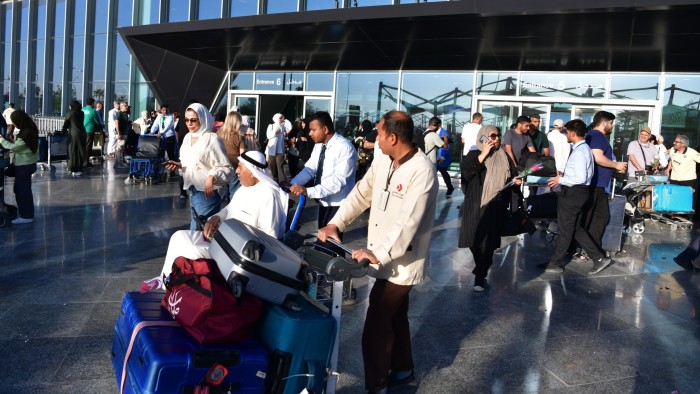Donald Trump’s choice to support Israel in its military initiative against Iran has sent shockwaves through Gulf states that had recently welcomed the U.S. President with lavish celebrations and investment commitments. Just weeks prior, Gulf leaders had implored Trump to pursue diplomatic routes with Tehran rather than escalatory tactics that risked igniting a conflict threatening their national security.
Iran has historically posed a political and military challenge to the region’s economic powerhouses, Saudi Arabia and the United Arab Emirates. However, in recent years, these monarchies have sought to foster better relations with Iran. The sudden outbreak of hostilities has left them increasingly anxious about their future in a fragile Middle Eastern landscape.
The Persian Gulf’s waters, only 200 miles wide at their broadest and less than 50 miles at their narrowest, place Gulf nations within striking distance of Iranian missiles and vital U.S. military installations. As such, these countries are intent on steering clear of being sucked into a wider conflict.
The potential for a protracted war could not only destabilize Iran—a nation of approximately 90 million people—but also push its leadership to consider nuclear weapons as a means of self-defense. Both scenarios would force Gulf nations, who have worked to ease tensions with Tehran, to contend with the aftermath of chaos, a situation they are eager to avoid.
“The last time we saw war in the Middle East, we saw the fragmentation of the region,” remarked Albadr Alshateri, a professor at the National Defence College in Abu Dhabi. He referenced the 2003 U.S.-led invasion of Iraq as a turning point that led to lasting damage and empowered Iran while inflaming sectarian divides.
Initial responses to the U.S. strikes have been characterized by unease. Eyad Alrefai of King Abdulaziz University described the atmosphere on Sunday morning as one of “shock and concern,” noting a surge of urgent discussions on social media platforms highlighting widespread anxiety about escalating tensions.
In Kuwait, reactions varied significantly, with one consultant noting responses ranging from disbelief to frantic precautionary measures. The country’s finance ministry reassured workers with information about designated shelters accommodating up to 900 individuals.
As British Airways temporarily halted flights to Dubai and Doha, expatriates in Qatar reported families opting to withdraw children from school and cut vacations short. Amid these developments, Bahrain dismissed 70 percent of civil servants, activated remote learning, and urged motorists to avoid major thoroughfares.
The aggressive stance against Iran underscores the discontent in the Gulf regarding Israel’s military actions, which detract from the Gulf’s focus on economic progress. Analysts such as Bader Al-Saif from Kuwait University believe Israel’s regional ambitions could extend significantly, raising concerns among Gulf leaders about a potential shift in power dynamics.
In response to the conflict, Gulf leaders have voiced opposition to Israel’s operations against their longstanding adversary, maintained communication with Tehran, and called for renewed negotiations between Iran and the Trump administration. Gulf monarchies have cautioned the U.S. against launching attacks from their territories, fearing that such actions could ignite retaliation from Iran.
Saudi Arabia and the U.A.E. have a complicated history with Iran. Trump’s earlier intensification of pressure on Tehran prompted warnings from Iranian officials about potential repercussions for the U.A.E. economy. Following limited U.S. responses to Iranian attacks on oil facilities in 2019, doubts arose regarding America’s commitment to Gulf security, nudging some states toward rapprochement with Iran.
“The relationship between the Arab side and the Iranians is at its best,” Alshateri asserted following years of diplomatic efforts. Hasan Alhasan, a Bahrain-based senior fellow for Middle East policy, emphasized that while Gulf states can advocate for non-involvement in the conflict and extend offers of mediation, their influence over this crisis remains constrained.
Despite these challenges, analysts note that the Gulf states maintain solid ties with the U.S. The statements released by Gulf nations were notably careful, avoiding direct criticism of Trump, with Oman being the sole outlier to label the strikes as “illegal.”

